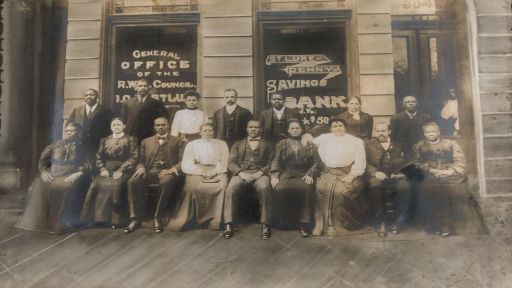|
Long before the civil rights movement of the 20th century, Black Americans were breaking down barriers in business, journalism, education and activism. Though faced with immense discrimination and hardship, these pioneers achieved notable firsts and paved the way for future generations. By celebrating their diverse achievements, we honor the creativity, determination and vision of these early African American pioneers. Their stories deserve to be told and celebrated.
Joseph Randolph (1768-1825) and the African Insurance Company A prominent businessman and community leader, Joseph Randolph demonstrates early Black excellence in pioneering finance and insurance. Born free in Virginia, Randolph later settled in Philadelphia and co-founded the Free African Society, a mutual aid organization for free Blacks. Seeing a need for Black citizens to have control over their money, Randolph founded the African Insurance Company in 1810. This was the first insurance company founded by an African American, 47 years before the American Life Insurance Company became the first Black-owned insurance firm chartered in the South. Randolph served as the President of the company, which provided fire and life insurance policies within Philadelphia's free Black community. His sons also became leaders in finance and civil rights, carrying on Randolph's legacy of entrepreneurship, innovation and community empowerment. David Ruggles (1810-1849): Abolitionist, Entrepreneur and Publisher A key figure in the Underground Railroad, David Ruggles was instrumental in the liberation of hundreds of enslaved persons. Born in Connecticut, Ruggles became actively involved in abolitionism and operated a small grocery store in New York City. This store doubled as a hub for escaped slaves, whom Ruggles assisted with shelter, food, clothing and transport further north. Highly organized and meticulous, he kept detailed records of the nearly 600 individuals he helped to freedom. Ruggles also founded an employment agency and was the first Black bookstore owner when he opened his Mirror of Liberty bookstore. Alongside his abolitionism and businesses, Ruggles edited and published The Mirror of Liberty newspaper, one of the earliest Black-owned and operated newspapers. Suffering poor health and blindness in his forties, Ruggles retired from activism but left an important legacy in the antislavery movement and African American entrepreneurship. Mary Ann Shadd Cary (1823-1893): Activist and First Black Woman Publisher Born to abolitionist parents, Mary Ann Shadd Cary stands out as a pioneering activist, teacher, lawyer and journalist. After teaching in her home state of Delaware, where education for free Blacks was restricted, Cary moved to Canada and began a teaching career there. She quickly became an advocate for civil rights and suffrage, writing and speaking on abolitionism and racial inequality. Cary founded The Provincial Freeman newspaper in 1853, becoming the first Black woman publisher in North America. The newspaper provided an important platform to voice anti-slavery views, promote Black Settlement in Canada and document the experiences of Black people in the Americas. Cary edited The Provincial Freeman until 1860, balancing her work with continuing efforts supporting education and woman's rights. After the Civil War, Cary returned to the United States, attending Howard University Law School and becoming one of the first Black female lawyers in the country. She worked tirelessly throughout her long career to open doors for African Americans and women through her writing, activism and pioneering professional roles. Sarah E. Goode (1850-1905): Inventor and Patent Holder Sarah E. Goode gained her freedom following Emancipation and became a pioneer in business and invention. Operating a furniture store in Chicago with her husband Archibald, Goode saw a need for space-saving furniture to accommodate the cramped living quarters of city-dwellers. She invented a cabinet bed that folded up against the wall, including storage space and a pop-up desk. Goode was granted a patent for the invention on July 14, 1885, becoming the first African American woman to hold a U.S. patent. Her clever furniture design enabled tenants to transform small apartments into usable spaces, while providing her a source of income and recognition for her talent. Goode used her success to become an advocate for African American and women's rights. She was active in her community, forming a local club for Black women and speaking on civil rights issues. Sarah E. Goode stands out as an early example of female ingenuity and entrepreneurship. Though faced with legalized discrimination and prejudice, these groundbreaking African Americans achieved monumental accomplishments in business, activism, education and media. From pioneering professions to establishing successful enterprises, they paved the way for future generations of Black entrepreneurs, inventors, journalists and change-makers. #BlackHistoryMonth2024 #BlackAchievement #SeraileBrandingIQ #FractionalCMO #BlackPioneers #BlackEntrepreneurs
0 Comments
August marks Black Business Month, a time to recognize and celebrate the contributions and achievements of Black entrepreneurs and business owners. This annual observance originated in 2004 when John William Templeton, founder of the National Black Business Trade Association, declared the month as a way to drive the policy agenda impacting the 2.6 million Black-owned businesses in America. Nearly two decades later, Black Business Month continues to highlight the tremendous progress Black entrepreneurs have made, while also underscoring the ongoing challenges they face.
According to the U.S. Census Bureau's Annual Business Survey, the number of Black-owned employer businesses increased by 26% from 2012 to 2021. And research shows that supporting these businesses boosts the economy overall. A 2021 McKinsey study found that achieving racial equity in business could add $5 trillion to U.S. GDP by 2030. So how can business leaders maximize Black Business Month 2023? Here are a few ideas:
Fostering an environment where Black businesses have equitable access to financial, educational, and community resources will benefit the economy as a whole. Black Business Month serves as a reminder of the vital role these entrepreneurs play and the potential they hold to reshape industries, spark innovation, and build generational wealth, if given the chance to fully and fairly compete. Equity in entrepreneurship benefits everyone. Last week, a group of leading Asian American executives launched the Asian American Foundation, an organization aimed at increasing opportunities for Asian Americans and Pacific Islanders (AAPI) and putting a stop to anti-AAPI violence and discrimination. The foundation’s board pledged $125 million—the biggest philanthropic commitment ever made in support of AAPI groups and causes—and a range of partners (including McKinsey) together pledged another $125 million. A 2019 McKinsey analysis showed that Asian leaders made up just 3 percent of Fortune 500 CEOs—half the Asian American share of the US population. To advance workplace equity, organizations should start by tracking representation along the promotion pipeline, identifying where there are drop-offs, and asking why those drop-offs are occurring. Experiences can vary significantly across subgroups—which means collecting disaggregated data can yield important insights. Source: McKinsey & Co, May 12, 2021 #stopasianhate In honor of #BlackHistoryMonth, let’s celebrate the innovations of America’s Black #entrepreneurs. This PBS series, first aired in 2019, highlights the achievements of inventors, business builders and executives of African descent. You can stream many episodes now at https://lnkd.in/gdFP2ac
|
Author
Cheryl A. Seraile is a Full Stack Marketing & Strategy Leader, with a passion for uncovering new trends and insights about consumers, demographics, culture and the world. Categories
All
|



 RSS Feed
RSS Feed